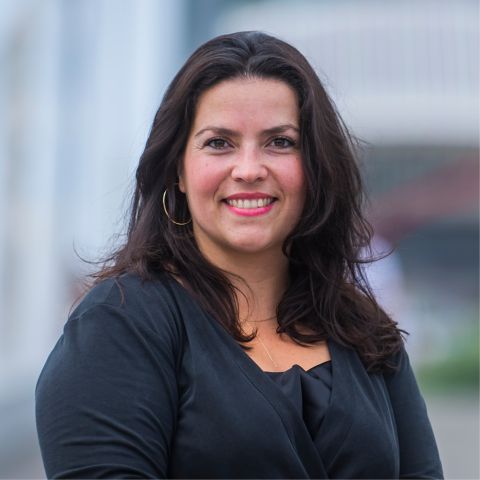Testimonials City of Liège uses data to map tourist flow
Also known as “the ardent city”, Liège is an attractive destination for tourists. Its museums, churches and river shuttle welcome droves of visitors. Others prefer to roam the city, indulge in some shopping or visit the local art galleries – meaning they’re not included in the visitor statistics. “We had no idea of the number of visitors apart from those who dropped by for a few words of explanation or those who booked a room at a hotel,” says Elise Dereppe, communication manager at Liège Tourist Office. “That’s why we went in search of a solution that would give us a more accurate picture of tourist movements in our city.”
Overview of all visitors
The Tourist Office turned to Orange for the solution. With Data Analytics, Orange has an IT solution that can anonymously collect the location data of mobile phones on the Orange network. How often are particular locations visited, where do visitors come from, how do they navigate the city, what are the busiest periods? These are all questions that Data Analytics can answer.
“We opted for Orange because they gave us easy access to the data,” Dereppe explains. “Every other month we receive an overview of the people flows in two tourist areas in Liège. If there is a festival, for instance, we can see how many people were in the city during the festival and where they came from. This allows us to map out which events are a draw for tourists and which events are less popular.”
Data Analytics has given us a deeper insight into the diversity of tourists. Elise Dereppe, communication manager at Liège Tourist Office
Lockdown lessons
The Tourist Office started collecting data in January 2020, two months before the national lockdown due to the outbreak of the Covid-19 pandemic. Dereppe looks back on that period: “Initially we were disappointed, because at the exact moment we had such a powerful tool at our disposal, the tourists stayed away. But little by little, as the lockdown measures gradually relaxed, we realised this was a unique opportunity. The museums were the first to open, then the shops, the restaurants and bars. That gradual reopening of society allowed us to analyse with great precision what the tourists found most important.”
Better than instinct
Thanks to Data Analytics, the Tourist Office can now make decisions based on data instead of instinct. “For example, every year on 15 August we organise a major festive event, with traditional processions that always draw huge crowds,” says Dereppe. “We thought these festivities also attracted tourists, but Orange’s data disproved our assumptions: as it turns out, most of these visitors are from Liège and the surrounding area.”
In addition, the Tourist Office gained a clearer view of which period of the year is the most popular among tourists. “Based on the numbers of hotel bookings and visitor counts in the institutions, we always thought that the busiest period for tourists in our city was April to July, with an additional peak for the Christmas market in December. However, the data showed that the period from September to December is quite popular for tourism too. That’s why this year the guided tours, which normally run from April to October, will be extended until mid-November.”
Targeted marketing actions
Data Analytics also shows where these visitors come from. For foreign visitors, the location data indicated the country of origin; for domestic visitors the town where they live. This helps the Tourist Office to appeal to specific groups within Belgium, Dereppe adds. “The traffic situation is not perfect in Liège at the moment, so we launched a marketing campaign this year to motivate tourists to travel to Liège by train. That means they don’t have to worry about congestion or finding a parking space. The campaign specifically targets cities with a direct train connection to Liège, such as Brussels, Antwerp, Ostend, Ghent and Bruges. In a few months, we’ll be able to determine the impact of the campaign.”
Another example shows that not every tourist exhibits the same behaviour. “French and German tourists usually come on any day of the week, from Monday to Sunday, whereas visitors from Flanders often come during the weekend, from Friday to Sunday,” Dereppe explains. “Thanks to Data Analytics, we now have a clearer overview of that diversity. If we want to organise something for Flemish tourists, I now know the best time is from Friday to Sunday and not earlier in the week, whereas Tuesday is perfectly fine for an activity for French tourists.”
Simple analysis
The major advantage Data Analytics offers is user-friendliness. Dereppe: “Naturally I had some questions at first and I didn’t fully understand some of the data, but Orange was quick to supply transparent answers.” She also emphasises that you don’t need a background in maths. “I studied history and I wasn’t all that familiar with data analysis, but it’s a powerful and user-friendly platform and Orange provides excellent support. Meanwhile, I’ve been making my own reports based on the data I export from Data Analytics in the form of spreadsheets.”
Can location data optimise how your organisation functions? Discuss the possibilities of Data Analytics with our experts.
Liège Tourist Office welcomes visitors every day of the week in the 16th-century Halle aux Viandes. It offers them personalised advice and extensive information to make their visit to the city as enjoyable as possible.

